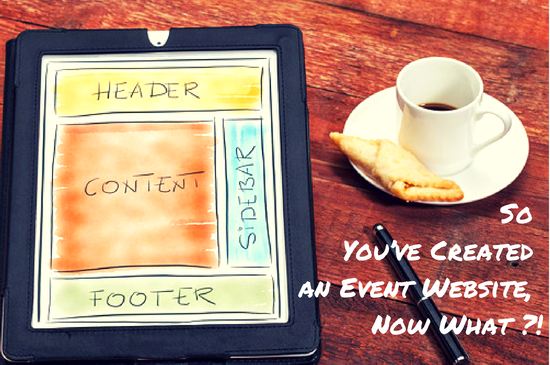Much is said about how to present your event website in terms of design, and making it user friendly – but what about the content itself? Of course this will vary enormously from event to event but there are several universally applicable ways to make your event website better at appealing to and converting leads into delegates. Here are my three content musts for any B2B event website.
Must Be Informative
In a previous post I reinforced the importance of getting your event website live as soon as the date and venue are confirmed, in order to start attracting attendees. These logistical elements can provide the bulk of your content while the programme details (speakers, breakouts, experiential elements etc) are being finalised. It doesn’t matter how pretty or how whizzy you make your website, at this stage its key purpose is providing information about your B2B event.
Always start with the basics. It might sound simple, but it doesn’t hurt to sense-check your website for these essentials:
• An event programme (or outline if not yet finalized)
• Speaker bios and photos
• Venue details, how to get there, map
• Contact details
• Sponsor logos
• Booking information and prices
Making contact information accessible and offering a range of contact methods is highly recommended. Be sure to include a and any other contact platforms used y your target audience. There’s nothing more frustrating than wanting to make an enquiry, but being greeted a generic form with no indication of when a faceless company will respond.
Must Be Inviting
In addition to providing information, your website is also your shop front, so it needs to work hard at selling your events. The benefits of attending or sponsoring your event need to be highly visible from the moment your prospects land. Do you have a clear and visible USP or value proposition on your homepage? If not, why?! Treat your website like you would a shop window, ‘dress’ it, and focus on what is going to appeal to your ‘passers-by’. This could be discounted passes and other special offers, new products, or high profile speakers.
Due to the prevalence of social media, consumers are also highly influenced by recommendations from friends, colleagues and contemporaries. This makes testimonials from attendees and sponsors an effective sales tool, so they should take pride of place on your website. Quotes gathered from supporters of your event can take the form of text, video or audio and, as long as they are authentic and convincing, can help steer your prospects’ decision-making.
Must Be Timely, Dynamic, Engaging
Keeping your web content up-to-date is important and reflects heavily on your organisation’s efficiency and professionalism. It can look sloppy to see social media mentions about a new speaker or change of venue without the website reflecting this recent alteration. Your event website must be launched as soon as your event is announced and updated as soon as changes are approved.
An event website must not be static and, especially during the promotional phase of your event cycle, it should be updated at least once a week, if not on a daily basis. Consider ways to make your content dynamic so that repeat visitors find something new every time they land on your site. You could include a live feed of Tweets featuring the event hashtag, and be sure to promote new blog posts when they go live (and just as a reminder – you should aim to publish at least one new post each week).
Ideally your website will also incorporate interactive elements so that your community can engage with you. This will play a key part in building customer loyalty and advocacy. Think about the legacy of your event website after the event itself is all wrapped up. How will you retain your leads for next year?
In Conclusion
Your event website doesn’t have to be perfect as soon as it’s live, but by covering these three elements you’ll have a great base to build upon. Remember, the harder your event website works for you, the less you’ll have to do to generate attendees (especially at the last minute). Once you’ve got the essentials down, you can get creative with your site content and focus on getting potential delegates to actually see it! Besides there are a lot of event website templates that can get you going straight away.
I’d love to hear what you consider to be essential content for your event website. What top content tips do you have for your fellow event marketers?
